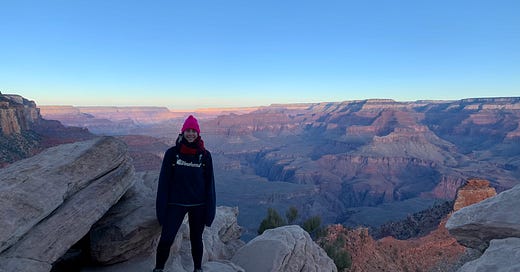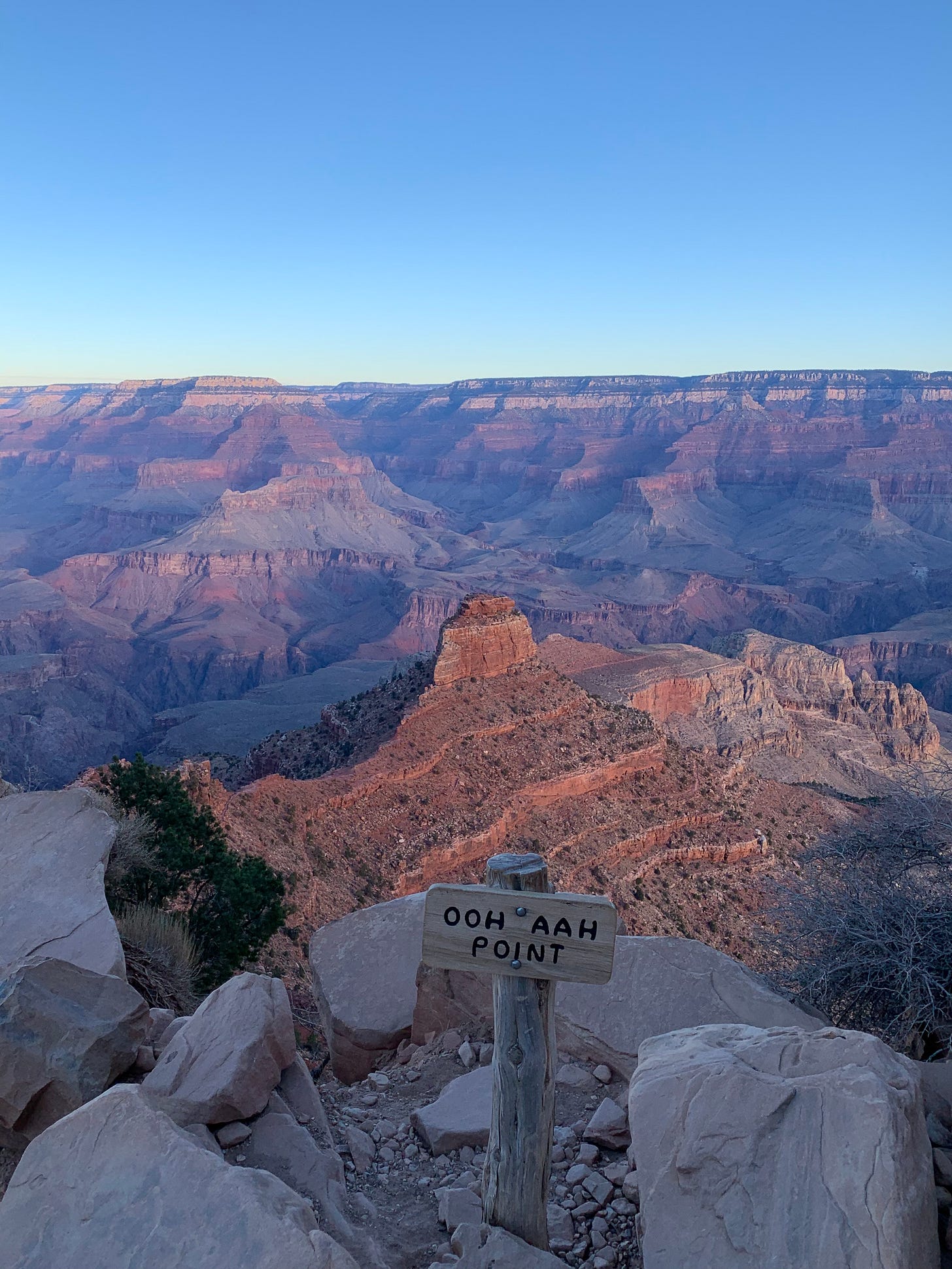At 10:30am on a brisk November morning last fall, I finished a six-mile solo hike in the Grand Canyon. It was three miles down at dawn, past Ooh Aah Point on to Skeleton Point, then three miles straight back up—and I was tired.
At this point in the pandemic, National Parks were serious about Covid safety. There were signs everywhere telling you to mask up and keep your distance. The complimentary shuttles had rows taken out of them so the seats were farther apart, and the bus drivers would tell you not to sit with someone not in your party.
Masked up, I climbed onto the shuttle that would take me back to the hotel room where my mother waited for me. I sat down with a sigh, setting my backpack on the empty seat to my left.
Then a brunette woman, who was also masked up and looked about 50, came up to me and said, “I guess I’m sitting next to you!”
“Sorry, no,” I said.
“Why not?” she asked.
Why not? Why not? Because a deadly pandemic had been raging for eight months? Because I was going to see my grandfather soon and was trying to be extra careful? Because every person on earth understands what “social distancing” means by now?
“Because of the pandemic,” I responded. (“DUH!” I screamed on the inside.)
She turned to her friends in the row behind me. “She won’t let me sit with her,” she grumbled. She found a seat and continued to complain about me. “Thank goodness I was able to find a seat or I wouldn’t have been able to ride the shuttle with you guys!” she said to her friends. The free shuttles arrive every six minutes, by the way, so it was always an option for her to quietly and kindly wait for the next one.
At the next stop, some people got off, and more got on to fill the empty seats. “Here, you can come sit next to me!” the woman said loudly. “Don’t go up there—she won’t let anyone sit next to her.” Can you believe?
I was uncomfortable and angry at the injustice of it all, but I kept my head forward and my mouth shut. I was raised right. She could go on embarrassing herself.
Fifteen minutes later we got to my stop, the last one on the route. Since I was near the front of the bus I was the last one off. I got up and awkwardly waited for the woman to get off ahead of me until, still inside the bus, she suddenly turned to face me.
“I want to apologize for how I reacted back there,” she said. I was shocked.
“Thank you, I appreciate that,” I said, “because I’m well within my rights.”
“You’re right,” she said as we both stepped off the bus. “But I have to tell you—if you’re serious about Covid, you might want to think about getting a better mask.”
My mouth was agape underneath my (admittedly kind of flimsy, not that I’d ever admit that to her) mask.
Then I said it: “Ma’am, I didn’t ask.”
Yes! Finally, an opportunity for a solid comeback showed up and I rose to the occasion! I was happy I got the last word in and that I remained respectful to someone so rude and out of line.
That was my only notable Covid confrontation, but that was far from the last time someone will try to trample right over the boundaries I’ve very reasonably set, and clearly communicated. That’s why “I didn’t ask” has become a go-to boundary for me. It’s so versatile and immediately puts the onus back on the other person to take responsibility for their own behavior—if they’re willing.
People give their unsolicited opinions constantly, especially people in positions of power (or perceived power). All sorts of people (especially older men) tripped over themselves to inform me it wasn’t safe for a woman to travel alone before I went on my solo road trip. If you share a life choice—”I’m becoming a lawyer.” “I’m having a baby.” “I’m not having a baby.” “I’m moving to another country.” “I’m getting plastic surgery.” “I’m going into space with Jeff Bezos.”—you can bet people will give you their opinion on your choice, whether you like it or not. Their reaction is, of course, a projection of their own fears and insecurities! But you don’t have to listen to their opinion. You didn’t ask! And that’s exactly what you’ll tell them.
They won’t like this—boundaries often feel awful and personal. They may be offended and get defensive. But you are not responsible for other people’s feelings. You are responsible for showing up for yourself, protecting your own peace, and setting appropriate boundaries with the people you allow into your life.
Months ago I listened to NPR’s Life Kit podcast about how to set and stick to boundaries with family. (Life Kit has so many useful episodes—check it out.) It’s a tricky business dismantling decades of unhealthy behaviors and dynamics, but it can be done. Wellness consultant Alex Elle advised listeners to start unpacking your own healthy boundaries by creating a boundary circle:
“Literally draw a circle on my page, and in the inside of that circle, I list the things that leave me feeling heard, seen and supported and things that I want in my relationships with people - so, like, clarity, open communication, honesty, et cetera, right? On the outside of the circle - anything that is a distraction, anything that leaves me feeling uneasy or anything that's just not welcomed inside of that circle of boundaries, it stays on the outside. And I'm able to get super clear with like, OK, if I'm going to be in relationship with certain people in my family, here is what I need, and here is what I don't.”
I drew up my own boundary circle and got clear on what behaviors I expect from those close to me. Some of the values I wrote inside the circle are care, concern, emotional intelligence, equity, and listening. Some I wrote outside the circle are disingenuity, yelling, lack of personal responsibility, selfishness, and fear-based behavior.
I have a family member who often spouts their unsolicited, negative opinions about my life without first taking the time to ask me about my thoughts and feelings about the situation. That’s not healthy or supportive, and I can no longer allow that behavior. So I decided to put my boundary circle to use.
Each time this person started spinning down the path of their own opinion about my choices, I gently said, “I didn’t ask.” The first few times I explained that I am the one in charge of my life, choices, and happiness, and while they are welcome to ask me questions about that and be in conversation with me, negative comments are unwelcome. After awhile, to my surprise, the boundary stuck! They started to hold their tongue around me, and even stopped themselves mid-sentence a couple of times. I set the boundary and they respected it, and now we can (hopefully) move forward with healthier communication.
I hope you try out the power of “I didn’t ask” in your own lives. Of course, people won’t always respect your boundaries, and that will be a clear sign to you that the relationship needs to change or possibly end. And please report back about the bewildered looks on people’s faces when they realize they can no longer shove their worldview down your throat—that’s my favorite part.
If you value Cruel Summer Book Club, please consider showing your support on Venmo @jillathrilla, or through PayPal. And thanks for sharing this newsletter with friends!
Thank you so much to readers Alla, Amelia, Andi, Annabel, Anne Marie, Ann-Kathrin, Brenna, Brittany, Brittany, Cara, Catherine, Christine, Courtney, Danielle, Edith, Emily, Erin, Esme, Grace, Hannah, Jacki, Julia, Kate, Katie, Katie, Mallory, Maria, Melanie, Molly, Naureen, Rachel, Rahul, Riddhi, Rocky, Samantha, Sarah, Sasha and Scarlett for your support!
You are not alone!






i love how useful this is! as someone that got bullied, i wish i could have learned and practiced this wisdom starting around age 7. I DIDN'T ASK!
I needed to read this! Thank you so much, Jillian